Frank-N-Furter head games with actor Joey Bostic
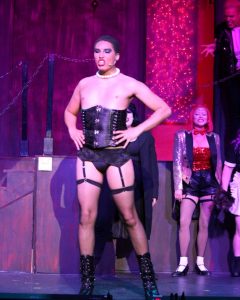 On stage at New Phoenix Theatre is Richard O’Brien’s randy, raucous and rowdy musical, the immortal Rocky Horror Show. The show’s star is that “sweet transvestite from Transsexual, Transylvania,” Dr. Frank-N-Furter. The iconic role is played to perfection by Joey Bostic.
On stage at New Phoenix Theatre is Richard O’Brien’s randy, raucous and rowdy musical, the immortal Rocky Horror Show. The show’s star is that “sweet transvestite from Transsexual, Transylvania,” Dr. Frank-N-Furter. The iconic role is played to perfection by Joey Bostic.
I recently had the pleasure of sitting down with Bostic to dissect old Frank and get into the illegal alien’s head.
According to conventional analysis, Frank-N-Furter is concerned primarily with himself “and lacks the ability to see the consequences of his behavior.” Bostic agrees with the former, but hotly contests the latter characterization.
“Whenever I come into 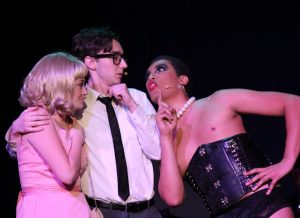 a show as a character, I always start by creating a backstory [for the character] so I can understand where they’re coming from and so that everything they do is [properly] motivated,” Bostic explains. “Then I work out the relationships between all the other characters and my character. I adapt that as the other actors identify their characters, and it evolves from there.”
a show as a character, I always start by creating a backstory [for the character] so I can understand where they’re coming from and so that everything they do is [properly] motivated,” Bostic explains. “Then I work out the relationships between all the other characters and my character. I adapt that as the other actors identify their characters, and it evolves from there.”
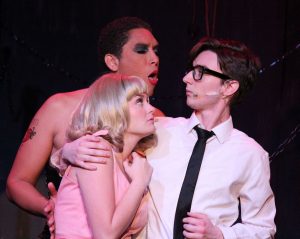 In Bostic’s estimation, Frank is definitely a being who places himself first. Whether that has been his mental make-up all along or he had to overcome insecurity and a lack of self-confidence to get there is open to question.
In Bostic’s estimation, Frank is definitely a being who places himself first. Whether that has been his mental make-up all along or he had to overcome insecurity and a lack of self-confidence to get there is open to question.
“I really want the audience to be able to see themselves in Frank and realize that it’s okay to take care of yourself. Like [the flight attendants] say on the airplane, ‘put your mask on first.’ Just  because others might perceive it as selfish, it’s not necessarily a bad thing. You have to take care of yourself before you can take care of anyone else.”
because others might perceive it as selfish, it’s not necessarily a bad thing. You have to take care of yourself before you can take care of anyone else.”
But in the next breath, Bostic makes a sage observation that provides the key to understanding his character.
“Of course, Frank only takes care of others to the extent it gives him pleasure.”
There’s nothing altruistic about his motivations.
And that’s not because 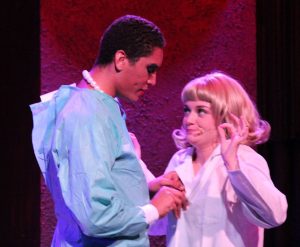 Frank-N-Furter is the penultimate narcissist, devoid of empathy and incapable of seeing how his actions affect others. How his behavior impacts those around him doesn’t matter. It’s all about him.
Frank-N-Furter is the penultimate narcissist, devoid of empathy and incapable of seeing how his actions affect others. How his behavior impacts those around him doesn’t matter. It’s all about him.
This aspect of Frank’s demeanor is perhaps best illustrated during “Hot Patootie (Bless My Soul),” sung by Eddie, one of Frank’s human lovers. As he sings, the other guests in Frank’s mansion mob Eddie. 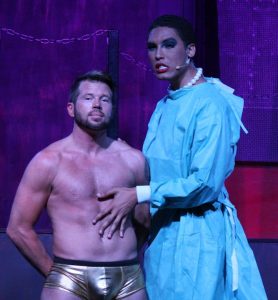 Another of Frank’s human love interests, Columbia, gazes at Eddie with love and adoration. As the number plays out on the floor beneath him, Frank paces back and forth on an open second floor walkway, daggers emanating from his dark and doleful eyes. Then Frank storms out of the room, only to return with a chainsaw that he duly uses to hack Eddie to death, tossing his dismembered remains into a meat locker.
Another of Frank’s human love interests, Columbia, gazes at Eddie with love and adoration. As the number plays out on the floor beneath him, Frank paces back and forth on an open second floor walkway, daggers emanating from his dark and doleful eyes. Then Frank storms out of the room, only to return with a chainsaw that he duly uses to hack Eddie to death, tossing his dismembered remains into a meat locker.
Most film and theater critics regard this as an act of revenge designed to punish Eddie for upstaging Frank and send a message to everyone else to never, ever make themselves the 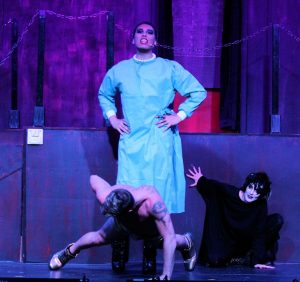 center of attention.
center of attention.
“But that’s not it,” Joey adamantly interjects. “Frank comes first and anything or anyone who interferes with that simply has to go.”
It may seem like a nuance without distinction, but it’s a key insight to understanding the character. In Frank-N-Furter’s world, life is transactional. Everything and everyone is measured and evaluated in terms of how it serves Frank and his wants, desires and pleasures. He is amoral. He is guiltless. 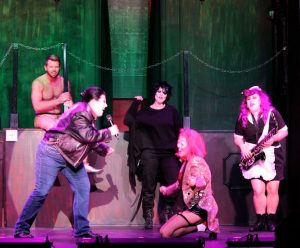 Perhaps because he is an alien, he operates by his own set of standards and is, therefore, not subject to judgment by others.
Perhaps because he is an alien, he operates by his own set of standards and is, therefore, not subject to judgment by others.
Including Columbia, who reproaches Frank following Eddie’s death.
“My God! I can’t stand any more of this,” she screams at him. “First you spurn me for Eddie, and then you throw him off like an old overcoat for Rocky! You chew people up and then you spit them out again. I loved 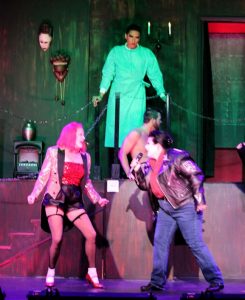 you. Do you hear me? I loved you! And what did it get me? Yeah, I’ll tell you: a big nothing. You’re like a sponge. You take, take, take, and drain others of their love and emotion. Yeah, well, I’ve had enough.”
you. Do you hear me? I loved you! And what did it get me? Yeah, I’ll tell you: a big nothing. You’re like a sponge. You take, take, take, and drain others of their love and emotion. Yeah, well, I’ve had enough.”
Bostic nails the response during this sequence. As Columbia launches into her diatribe, he looks at her with a mixture of boredom and bemusement – not because he doesn’t get what she’s saying, but because her opinion doesn’t matter. She’s trying to judge his behavior from her internal ethical constructs. But he’s not subject to her rules, or anyone else’s. He operates under his own set of rules!
And it is this 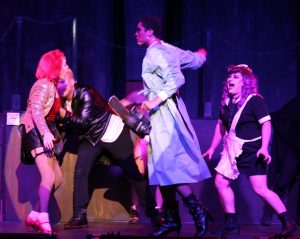 dichotomy that explains Frank-N-Furter’s odd reaction when Columbia throws herself in front of the beam coming from Riff Raff’s laser gun in a vain attempt to save his life.
dichotomy that explains Frank-N-Furter’s odd reaction when Columbia throws herself in front of the beam coming from Riff Raff’s laser gun in a vain attempt to save his life.
“Stupid bitch,” he chides, tossing her body aside. His disdain derives from a sense of condescension over the fact that she was too obtuse to realize that she meant no more to him than a cute floppy eared puppy who’d grown into an annoying drooling 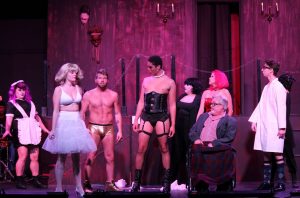 dog he had no further use of.
dog he had no further use of.
For context, it’s useful to make reference to a German philosopher by the name of Friedrich Nietzsche. In 1883, he wrote about an overman (ubermensch) who, recognizing that society’s definition of morality is socially constructed to subjugate the masses and induce them to behave themselves and be contented with 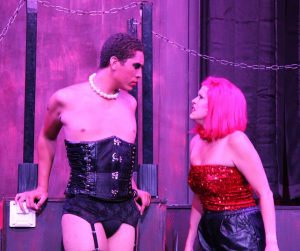 the scraps they might be tosses by the rich and powerful who controlled their fate. The overman sees through the illusion of a universal morality creates his own moral imperative. Ironically, in Nietzsche’s masterwork, Thus Spoke Zarathustra, he postulated that the ubermensch would dedicate him or herself solely to the advancement and betterment of humanity. Hitler and the Nazis had other ideas, co-opting his
the scraps they might be tosses by the rich and powerful who controlled their fate. The overman sees through the illusion of a universal morality creates his own moral imperative. Ironically, in Nietzsche’s masterwork, Thus Spoke Zarathustra, he postulated that the ubermensch would dedicate him or herself solely to the advancement and betterment of humanity. Hitler and the Nazis had other ideas, co-opting his 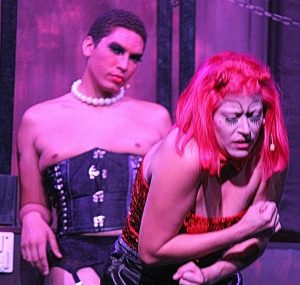 idea to motivate the German rank-and-file to bear arms against the rest of the world for the honor of their Fuhrer and the Fatherland.
idea to motivate the German rank-and-file to bear arms against the rest of the world for the honor of their Fuhrer and the Fatherland.
For his part, Frank-N-Furter dedicated his rules and standards solely to his own pleasure and gratification.
Again, Bostic supplies the reason why.
“We don’t know what his mission was,” Joey muses. “Perhaps he was sent from Transsexual to observe humans, but 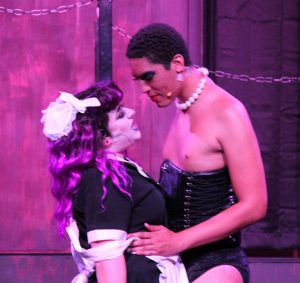 somewhere along the way, he decides to enjoy the beauty that Earth has to offer. He met Columbia, and they were together for a little while. Then he met Eddie and he and Eddie were together for a little while. And he picked up little pieces from each to put into Rocky and make Rocky into the perfect creature. He even comes to have feelings for Janet and Brad, which comes out in the ‘I’m Gone Home Number’ and how he pushes Brad out of the way so that he’s not struck by Riff Raff’s laser. Whether someone sees it or not, I know it’s
somewhere along the way, he decides to enjoy the beauty that Earth has to offer. He met Columbia, and they were together for a little while. Then he met Eddie and he and Eddie were together for a little while. And he picked up little pieces from each to put into Rocky and make Rocky into the perfect creature. He even comes to have feelings for Janet and Brad, which comes out in the ‘I’m Gone Home Number’ and how he pushes Brad out of the way so that he’s not struck by Riff Raff’s laser. Whether someone sees it or not, I know it’s  there.”
there.”
If this is true, then clearly Frank’s mission has gone awry, and perhaps that’s why Riff Raff and Magenta not only have to abort the mission, but abort Frank and Rocky as well.
Insights such as these are not just profound. They inform the manner in which Bostic portrays this iconic fictional character and brings a new and nuanced meaning to 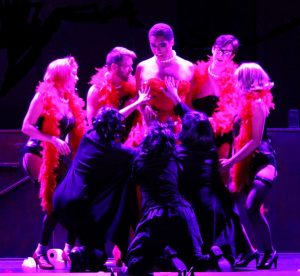 the entire show.
the entire show.
Most audience members come to the Rocky Horror Show for just a good time, and New Phoenix Theatre’s production of Richard O’Brien’s Rocky Horror Show provides a really good time for both audience and cast members. But compliments of Bostic’s research, thoughtful approach to character analysis and introspection, there’s also considerable meaning to mine.
Rocky Horror continues throughout October, 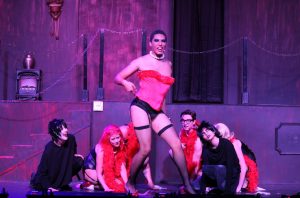 closing on Halloween night.
closing on Halloween night.
October 18, 2019.
RELATED POSTS.
- New Phoenix production adds to ‘Rocky Horror’ brand and mystique
- Blackston, Rocella, Frank and Jefferson set pace and tone for immersive ‘Rocky Horror’ experience
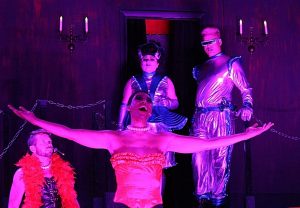 Spotlight on ‘Rocky Horror’ actor Joey Bostic
Spotlight on ‘Rocky Horror’ actor Joey Bostic- Spotlight on ‘Rocky Horror’ actor Sam Bostic
- Spotlight on ‘Rocky Horror’ actor Lisa Kuchinski
- Spotlight on ‘Rocky Horror’ actor Gabrielle Lansden
- Spotlight on ‘Rocky Horror’ actor Brian Linthicum
- Spotlight on ‘Rocky Horror’ actor Sage Meyers
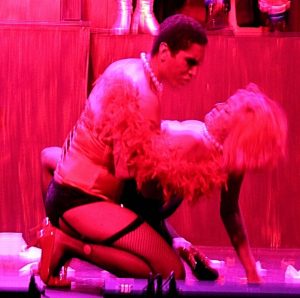 Spotlight on ‘Rocky Horror’ actor Shelley Sanders
Spotlight on ‘Rocky Horror’ actor Shelley Sanders- Spotlight on ‘Rocky Horror’ actor Eren Sisk














 Tom Hall is both an amateur artist and aspiring novelist who writes art quest thrillers. He is in the final stages of completing his debut novel titled "Art Detective," a story that fictionalizes the discovery of the fabled billion-dollar Impressionist collection of Parisian art dealer Josse Bernheim-Jeune, thought by many to have perished during World War II when the collection's hiding place, Castle de Rastignac in southern France, was destroyed by the Wehrmacht in reprisal for attacks made by members of the Resistance operating in the area. A former tax attorney, Tom holds a bachelor's degree as well as both a juris doctorate and masters of laws in taxation from the University of Florida. Tom lives in Estero, Florida with his fiancee, Connie, and their four cats.
Tom Hall is both an amateur artist and aspiring novelist who writes art quest thrillers. He is in the final stages of completing his debut novel titled "Art Detective," a story that fictionalizes the discovery of the fabled billion-dollar Impressionist collection of Parisian art dealer Josse Bernheim-Jeune, thought by many to have perished during World War II when the collection's hiding place, Castle de Rastignac in southern France, was destroyed by the Wehrmacht in reprisal for attacks made by members of the Resistance operating in the area. A former tax attorney, Tom holds a bachelor's degree as well as both a juris doctorate and masters of laws in taxation from the University of Florida. Tom lives in Estero, Florida with his fiancee, Connie, and their four cats.